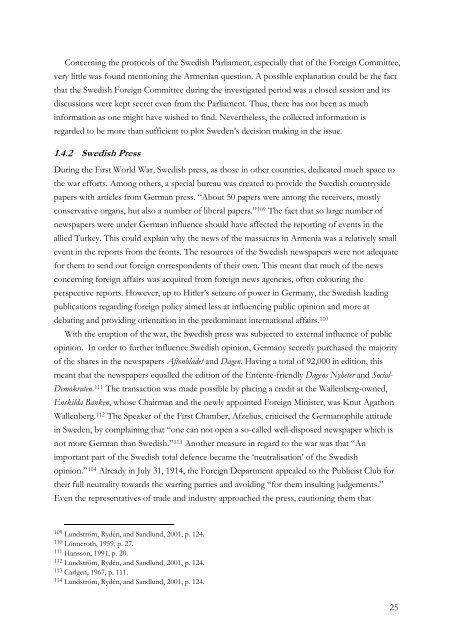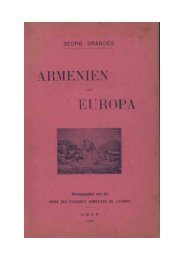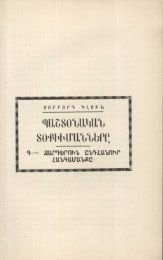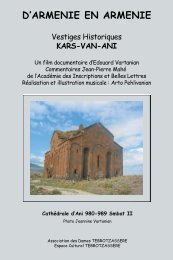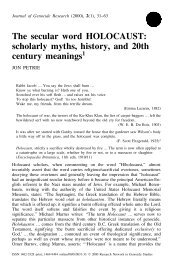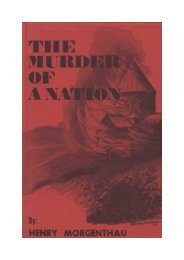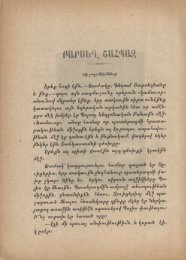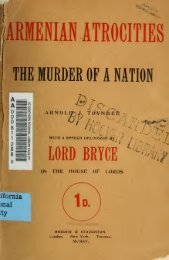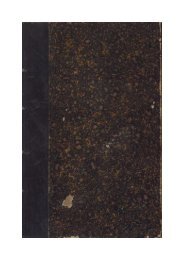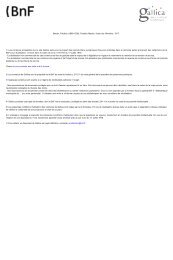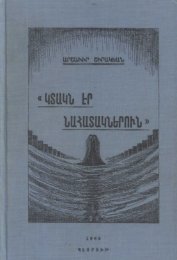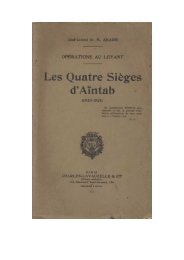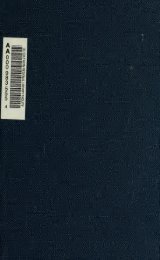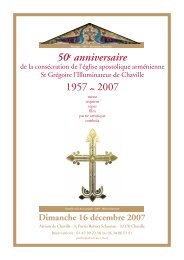1.4 Methodology and SourcesThis research is based upon information and statements on the massacres in Turkey, made bySwedish missionaries, media, foreign and military personnel in Turkey, and members of theGovernment. The Armenian massacres (and the Swedish awareness of them) goes back to themassacres during 1894-1896 and continues well into the 1930s. But, in this paper we will contentourselves with the information fr<strong>om</strong> 1915 to 1923. The chosen period marks the cul<strong>min</strong>ation ofthe Armenian genocide in 1915 until the de facto closure of the Armenian question (at least forthe time being on the international level) by the signing of the Treaty of Lausanne in 1923 andthe inclusion of the independent Armenian Republic into the Soviet Union. Another limitationwill be the total extent of the 1915 genocide, affecting far more Christian <strong>min</strong>orities in Turkeythan the Armenians alone. That this paper does, in essence, only mention the Armenian losses, isnot due to exclusion of other affected groups such as Syriacs, Chaldeans or Pontic Greeks, butmerely due to the fact that the investigated documents mainly contain information and referencesconcerning the fate of the Armenian nation. Where other <strong>min</strong>orities are mentioned they havebeen included in the study.In order to build an opinion about Swedish knowledge and argumentation in regard to theArmenian question, the study of archive material was conducted in search of any relevantinformation, regardless of their position in the matter, thus also including information denyingthe Armenian massacres or any state orchestrated annihilation policy.1.4.1 LimitationsAs already indicated, the foreign <strong>min</strong>istry and military dispatches were those fr<strong>om</strong> Constantinople,reporting the intelligence gathered by Swedish representatives in the Ott<strong>om</strong>an Empire. The scopefor the material was limited to the information fr<strong>om</strong> the Ott<strong>om</strong>an Empire, but the informationfield could be broadened further. Looking at the information dispatched by Swedishrepresentatives in other capitals, especially Berlin and Vienna, but also those stationed in Paris,London, Moscow, and Washington D.C. could reveal additional insight regarding the amountand the nature of the Swedish knowledge in regard to the Armenian massacres.Needless to say, the search included a much larger data and material than those files alonecontaining the bulk of the presented study. Most of the material here was, however, concentratedwithin the above mentioned categories. But, in order to eli<strong>min</strong>ate the risk of missing anyimportant information, the search was extended to all immediate file categories. Such an examplewas the study of the twelve volumes entitled Ink<strong>om</strong>na skrifter från underrättelsebyrån (“ReceivedLetters fr<strong>om</strong> the Intelligence Bureau”). Nevertheless, it showed that in those cases where therewas any relevant data, the information had already been included into the categories alreadyinvestigated. Having said that, the Foreign Department files are scattered over several differentvolumes and categories and an extended search could reveal additional documents.24
Concerning the protocols of the Swedish Parliament, especially that of the Foreign C<strong>om</strong>mittee,very little was found mentioning the Armenian question. A possible explanation could be the factthat the Swedish Foreign C<strong>om</strong>mittee during the investigated period was a closed session and itsdiscussions were kept secret even fr<strong>om</strong> the Parliament. Thus, there has not been as muchinformation as one might have wished to find. Nevertheless, the collected information isregarded to be more than sufficient to plot Sweden’s decision making in the issue.1.4.2 Swedish PressDuring the First World War, Swedish press, as those in other countries, dedicated much space tothe war efforts. Among others, a special bureau was created to provide the Swedish countrysidepapers with articles fr<strong>om</strong> German press. “About 50 papers were among the receivers, mostlyconservative organs, but also a number of liberal papers.” 109 The fact that so large number ofnewspapers were under German influence should have affected the reporting of events in theallied Turkey. This could explain why the news of the massacres in Armenia was a relatively smallevent in the reports fr<strong>om</strong> the fronts. The resources of the Swedish newspapers were not adequatefor them to send out foreign correspondents of their own. This meant that much of the newsconcerning foreign affairs was acquired fr<strong>om</strong> foreign news agencies, often colouring theperspective reports. However, up to Hitler’s seizure of power in Germany, the Swedish leadingpublications regarding foreign policy aimed less at influencing public opinion and more atdebating and providing orientation in the predo<strong>min</strong>ant international affairs. 110With the eruption of the war, the Swedish press was subjected to external influence of publicopinion. In order to further influence Swedish opinion, Germany secretly purchased the majorityof the shares in the newspapers Aftonbladet and Dagen. Having a total of 92,000 in edition, thismeant that the newspapers equalled the edition of the Entente-friendly Dagens Nyheter and Social-Demokraten. 111 The transaction was made possible by placing a credit at the Wallenberg-owned,Enskilda Banken, whose Chairman and the newly appointed Foreign Minister, was Knut AgathonWallenberg. 112 The Speaker of the First Chamber, Afzelius, criticised the Germanophile attitudein Sweden, by c<strong>om</strong>plaining that “one can not open a so-called well-disposed newspaper which isnot more German than Swedish.” 113 Another measure in regard to the war was that “Animportant part of the Swedish total defence became the ‘neutralisation’ of the Swedishopinion.” 114 Already in July 31, 1914, the Foreign Department appealed to the Publicist Club fortheir full neutrality towards the warring parties and avoiding “for them insulting judgements.”Even the representatives of trade and industry approached the press, cautioning them that109 Lundström, Rydén, and Sandlund, 2001, p. 124.110 Lönneroth, 1959, p. 27.111 Hansson, 1991, p. 20.112 Lundström, Rydén, and Sandlund, 2001, p. 124.113 Carlgen, 1967, p. 111.114 Lundström, Rydén, and Sandlund, 2001, p. 124.25
- Page 3 and 4: 1 Introduction.....................
- Page 5 and 6: War, rather confirm the version of
- Page 7 and 8: 1.2 Previous ResearchWhen discussin
- Page 9 and 10: Military Attaché and the missionar
- Page 11 and 12: situation: “It is a crime when Te
- Page 13 and 14: in the following investigation, whi
- Page 15 and 16: killed. The slaughterer slaughtered
- Page 17 and 18: interests. Despite his famous “14
- Page 19 and 20: morality, balance of power, or the
- Page 21 and 22: 4. International organisations (e.g
- Page 23: warring parties. 104 This observati
- Page 27 and 28: present in Turkey. These documents
- Page 29 and 30: He also mentions meeting an Armenia
- Page 31 and 32: the annihilation. General von Losso
- Page 33 and 34: 1.5 BackgroundIn order to understan
- Page 35 and 36: 1914, when two inspector-generals f
- Page 37 and 38: to Islam or were sold as slaves to
- Page 39 and 40: 2 Empirical AnalysisThe empirical r
- Page 41 and 42: It does not seem to be the Turkish
- Page 43 and 44: The Turks claim that, at the Russia
- Page 45 and 46: The Armenian population has equippe
- Page 47 and 48: 1917 was the revival year for the A
- Page 49 and 50: Even if the communication between t
- Page 51 and 52: implemented against the Armenian na
- Page 53 and 54: Anckarsvärd continued claiming tha
- Page 55 and 56: Germany is blamed for its accessory
- Page 57 and 58: Here Wirsén took the liberty to co
- Page 59 and 60: On February 19, news of new Armenia
- Page 61 and 62: estricted to the fields of intrigue
- Page 63 and 64: generous offer of President Wilson
- Page 65 and 66: Lange gave a detailed description o
- Page 67 and 68: skin was totally scorched. Another
- Page 69 and 70: which her recurrently emphasised th
- Page 71 and 72: The sooner calls referring to the A
- Page 73 and 74: Despite these facts, Armenia was th
- Page 75 and 76:
Svenska Riksarkivet [Swedish Nation
- Page 77 and 78:
Bakhtiari, Kalla det vad fan du vil
- Page 79 and 80:
Chan, Steve and Drury, Cooper A., S
- Page 81 and 82:
Moranian, Suzanne Elizabeth, Bearin


